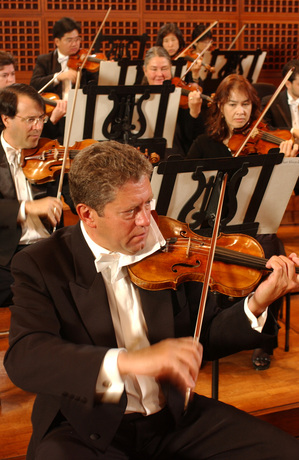
A week before Thanksgiving in 1995, the great violinist Itzhak Perlman, accompanied by a symphony orchestra, was about to give a concert at Lincoln Center in New York City. Shortly after beginning, however, one of the strings on his violin broke; this happened loudly enough that the other musicians heard it, and they stopped playing. Everyone assumed Perlman would need to replace the string, or find another violin to play. However, the famous musician merely closed his eyes for a moment and composed himself, and then—to the amazement of the musicians and the audience—signaled to the conductor to start the piece over from the beginning. As one author described the event, Perlman “played with a passion and a power and a purity such as they had never heard before. Of course, everyone knows that it is impossible to play a symphonic work with just three strings . . . but that night Itzhak Perlman refused to know it. You could see him modulating, changing, recomposing the piece in his head. At one point, it sounded like he was de-tuning the strings to get new sounds from them, sounds they had never made before” (William J. Bausch, 40 More Seasonal Homilies, pp. 84-85).
This incredible performance was followed by a moment of awestruck silence, and then the audience gave the violinist a rousing and prolonged standing ovation, their way of acknowledging they had witnessed something almost miraculous. After a few minutes Perlman signaled for silence, and then announced in a quiet, reverent tone, “You know, sometimes it is the artist’s task to find out how much music you can still make with what you have left” (Bausch, op. cit., p. 85). A great musician gave an amazing performance under difficult conditions because he was willing to take a chance. In the same way, God can multiply our efforts—if we give Him our trust.
Why is it that life is sometimes dull, disappointing, or problematic? One reason may be that we’re too slow to let God’s grace work in and through us; our weaknesses and doubts may keep us from speaking up, taking a chance, or getting involved—thereby wasting an opportunity, missing out on a graced moment, or perhaps even preventing God from using us to accomplish a small miracle. The Lord respects our free will; when we say “no,” He doesn’t force us to do what’s right, even though it truly would have been better for us. When we say “yes,” however, amazing things can happen.
In Second Kings (4:42-44), Elisha’s servant initially objected to the idea of setting only twenty loaves of bread in front of one hundred hungry people—but when the prophet reassured him the Lord had promised there would be more than enough, the servant complied, and his obedience was rewarded. He could have said “No, this is ridiculous and I won’t be part of it,” just as the boy in John’s Gospel (6:1-15) with the five barley loaves and two fish could have said, “Hey, my mother gave this food to me, and I’m not going to share it.” In each case, however, a spirit of trust brought about amazing results. The prophet Elisha presided over the feeding of one hundred men with only twenty loaves; as the Son of God, Jesus worked an even greater miracle, feeding a far larger crowd with less food—all because a boy trusted Him enough to share his dinner, and because the apostles obeyed Him by beginning to distribute the food even before they witnessed the actual miracle. Jesus tested them, and they passed. St. Paul, in his Letter to the Ephesians (4:1-6) urges us to live in a manner worthy of the calling we have received, and one of the things this means is doing whatever we can to cooperate with God’s plan—a plan far greater than we can imagine, and a plan that can accomplish wonderful things, if only we say “yes” in our hearts.
Many times it seems we’re like violinists trying to perform on an instrument with a broken string. Perhaps health problems are keeping us from doing all the things we used to do, or at least slowing us down and limiting our effectiveness. Maybe fear or worries or depression make it hard for us to motivate ourselves, make decisions, or even get out of bed in the morning. It’s possible that a serious misunderstanding with a loved one, or unjust criticism, or an unpleasant encounter with someone, has robbed us of our peace and made it hard to concentrate on what we need to do. All these things, along with financial worries, assorted aches and pains, grief, disappointment, feeling unappreciated, and various other types of difficulty and stress, can easily make us feel unenthusiastic, doubtful, and even convinced we have nothing to offer and there’s no point in trying.
This is the wrong attitude; it may be understandable, but it’s not productive, and it sells God short. He is able to do wondrous things—but we must give Him the chance. Do you know someone who’s lonely, worried, or grieving? Reach out to him or her in a spirit of compassion. No, you won’t have the solution to all that person’s problems, or be able to say words that magically change his or her life—but many times God will use your simple expression of concern to lift that person’s spirit in a truly meaningful way. Do you sometimes think, “If only I could win the lottery, I’d give a lot of money to the Church and to my favorite charities?” That’s probably not going to happen—but even though you’re not a lottery millionaire, if you donate regularly to the extent your finances allow—perhaps even by tithing—God will allow your contributions to accomplish important things. Do you find yourself amazed at how the saints were able to spend long hours in prayer and contemplation, and think their spiritual achievements are far beyond anything you can accomplish? Perhaps so—but if you regularly spend quiet time in the Lord’s presence, preferably every day, you too will be touched by His grace and slowly but surely formed into a spiritually beautiful and gracious future citizen of Heaven.
A musician quite naturally assumes his or her instrument needs to be in good working order so as to produce pleasing results, but God does not have that expectation of us. He knows we are weak, sinful, mistake-prone human beings, and He takes this reality into consideration as His plan of salvation unfolds. As long as we cooperate and obey in a spirit of trust, the One Who multiplied the loaves and the fish can also work powerfully in and through us—filling us with surprising freedom and peace in this life, and preparing us for perfect and everlasting joy in the life to come.








